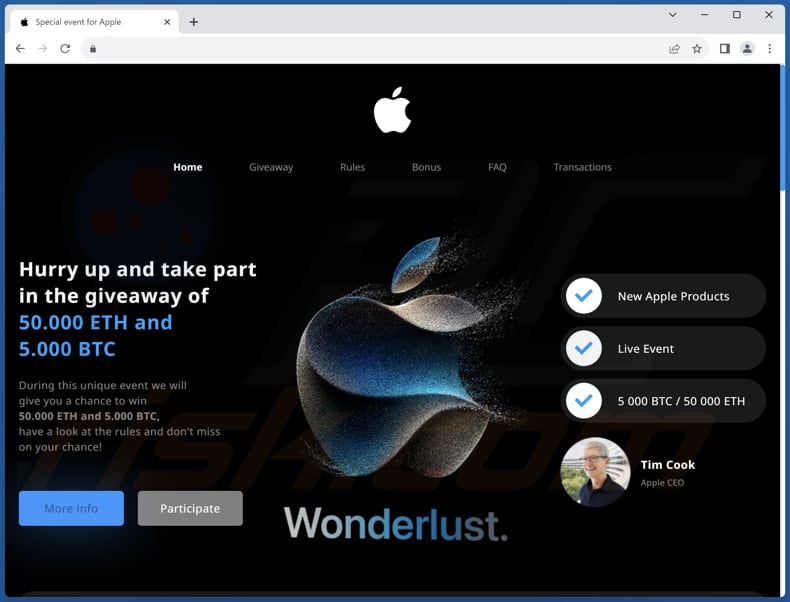How to avoid falling for scams like the "Apple Crypto Giveaway" pop-up scam
Phishing/ScamAlso Known As: Apple Crypto Giveaway scam
Get free scan and check if your device is infected.
Remove it nowTo use full-featured product, you have to purchase a license for Combo Cleaner. Seven days free trial available. Combo Cleaner is owned and operated by RCS LT, the parent company of PCRisk.com.
What is Apple Crypto Giveaway?
After examining the website, our team concluded that it promotes a fraudulent giveaway. Typically, scammers employ websites displaying deceptive pop-up messages or similar content to entice visitors into disclosing sensitive information, sending money, or taking other actions. Consequently, it is strongly advisable not to place trust in such websites.

Apple Crypto Giveaway scam in detail
The page hosting this giveaway scam presents itself as an announcement from Apple, claiming to celebrate the launch of the new iPhone 15 Pro & Pro Max powered by A17 Pro. It alleges to initiate an airdrop pool of 5,000 Bitcoins (BTC) as a token of appreciation to the Apple community.
This scam page encourages users to participate by clicking on the provided links to the "official" BTC airdrop portal, with promises of receiving free BTC and ETH. Notably, it states that all individuals, including those in the United States, can participate and that all wallets and exchanges are eligible.
However, the message on this deceptive page is designed to lure users into a scam. It falsely presents itself as an official Apple initiative, aiming to deceive users into providing personal information or performing actions that benefit the scammer.
Typically, scammers behind giveaway scams request "processing fees" or ask victims to send cryptocurrency or money to claim their supposed rewards, diverting funds directly into the scammer's pockets. Also, they may attempt to collect personal information (e.g., login credentials, credit card information, or other details) from victims.
There is another deceptive page running a fake Apple giveaway (see screenshot below) that promises participants the chance to win significant amounts of cryptocurrency (50,000 ETH and 5,000 BTC). It claims that by sending a specific amount of cryptocurrency to a provided address, participants will receive double the amount in return.
However, this is a classic cryptocurrency scam, as participants are asked to send their cryptocurrency to an unverified address with the false promise of receiving more in return. There is no legitimate giveaway, and those who send their cryptocurrency will likely lose it without any chance of receiving the promised rewards.
| Name | Apple Crypto Giveaway scam |
| Threat Type | Phishing, Scam, Social Engineering, Fraud |
| Fake Claim | Visitors have the opportunity to receive BTC and ETH at no cost |
| Disguise | Legitimate giveaway hosted by the Apple company |
| Related Domains | cryptapple[.]com, apple23event[.]com |
| Detection Names (cryptapple[.]com) | Combo Cleaner (Malware), CRDF (Malicious), CyRadar (Malicious), Kaspersky (Phishing), Sophos (Phishing), Full List Of Detections (VirusTotal) |
| Serving IP Address (cryptapple[.]com) | 185.149.120.113 |
| Detection Names (apple23event[.]com) | N/A(VirusTotal) |
| Serving IP Address (apple23event[.]com) | 104.21.79.250 |
| Crypto Wallets Belonging To Scammers | 1jwBAdHUSHwy9bxkrdgMwi43KdcYEhYLA (BTC), 0x21257Ab0450E07f82908Fb244BaACC7F2df756d5 (ETH) |
| Symptoms | Fake error messages, fake system warnings, pop-up errors, hoax computer scan. |
| Distribution methods | Compromised websites, rogue online pop-up ads, potentially unwanted applications. |
| Damage | Loss of sensitive private information, monetary loss, identity theft, possible malware infections. |
| Malware Removal (Windows) |
To eliminate possible malware infections, scan your computer with legitimate antivirus software. Our security researchers recommend using Combo Cleaner. Download Combo CleanerTo use full-featured product, you have to purchase a license for Combo Cleaner. 7 days free trial available. Combo Cleaner is owned and operated by RCS LT, the parent company of PCRisk.com. |
Similar scams in general
Giveaway scams typically involve fraudulent online promotions that promise valuable rewards, such as cryptocurrency, gadgets, or gift cards, in exchange for user participation. Scammers use various tactics, like impersonating well-known brands or individuals, to create an illusion of legitimacy.
Victims are often tricked into providing personal information, sending money, or taking actions that benefit the scammers, while the promised rewards are never delivered. These scams exploit trust and the desire for freebies to deceive individuals and potentially lead to financial losses and privacy breaches.
Examples of giveaway scams are "Mr Beast GIFT CARDS GIVEAWAY", "Bittrex Crypto Giveaway", and "Andrew Tate Crypto Giveaway".
How did I open a scam website?
Users can end up on deceptive pages like the one described through various online pathways. Clicking on deceptive or misleading online advertisements, especially those promising easy money and free rewards, can redirect users to such pages.
Also, users may unknowingly click on malicious links in emails, social media messages, or compromised websites, leading them to deceptive pages. Additionally, deceptive pages can sometimes appear in search engine results, exploiting popular search queries or keywords to lure users.
In other cases, certain browser extensions (e.g., advertising-supported apps) can force browsers to redirect users to deceptive pages without their consent.
How to avoid visiting scam pages?
Be skeptical of unsolicited offers that seem too good to be true, especially those received via email or social media. Check the legitimacy of offers by visiting official websites or contacting trusted sources directly rather than clicking on provided links. Examine website URLs carefully - scams often use misspelled or suspicious URLs.
Stick to well-known search engines like Google, Bing, or Yahoo, as they are more likely to filter out malicious websites from search results. If your computer is already infected with unwanted apps, we recommend running a scan with Combo Cleaner Antivirus for Windows to automatically eliminate them.
The appearance of "Apple Crypto Giveaway" pop-up scam (GIF):

Text in this page:
Apple 5,000 BTC Airdrop!
5000 BTC Giveaway
Apple has come along way in the past year and we couldn’t do it without you.
To celebrate new iPhone 15 Pro & Pro Max powered by A17 Pro, we are proud to announce initiating the airdrop pool of 5,000 Bitcoin (BTC)! Nothing we do at Apple would be possible without our community, and this is just a part of our efforts to assert that.
If you want to participate, it is simple to do. Just navigate to the BTC airdrop portal below to learn more:
Click this — official link to get free BTC
Click this — official link to get free ETH
Note: All persons are able to participate, including those in the United States. All wallets and exchanges are eligible! The competition will last until the entirety of the 5,000 BTC held in the airdrop-funds have been released. If you are late, your BTC will be instantly refunded.Best wishes,
Tim Cook
Screenshot of the second variant of the Apple Crypto Giveaway scam:

Text in this scam:
Home Giveaway Rules Bonus FAQ Transactions
Hurry up and take part in the giveaway of 50.000 ETH and 5.000 BTC
During this unique event we will give you a chance to win
50.000 ETH and 5.000 BTC, have a look at the rules and don't miss on your chance!
About
We believe that Blockchain and BTC coin will make the world more
fair. To speed up the process of cryptocurrency mass adoption,
We decided to run 5 000 BTC giveaway.Rules
To participate you just need to send from 0.1 BTC to 50 BTC
to the contribution address and we will immediately send you back
0.2 BTC to 100 BTC (x2) to the address you sent it from.About
We believe that Blockchain and ETHcoin will make the world more
fair. To speed up the process of cryptocurrency mass adoption,
We decided to run 50 000 ETH giveaway.Rules
To participate you just need to send from 1 ETH to 500 ETH
to the contribution address and we will immediately send you back
2 ETH to 1000 ETH (x2) to the address you sent it from.3 654 BTC already sent to participants!
Hurry up and take part in the giveaway!
Use this QR code to participate or BTC address to participate
You can send BTC to the following address:
1jwBAdHUSHwy9bxkrdgMwi43KdcYEhYLA
Waiting for payment
3 654 ETH already sent to participants!
Hurry up and take part in the giveaway!Use this QR code to participate or ETH address to participate
You can send ETH to the following address:
0x21257Ab0450E07f82908Fb244BaACC7F2df756d5
Waiting for payment
Instant automatic malware removal:
Manual threat removal might be a lengthy and complicated process that requires advanced IT skills. Combo Cleaner is a professional automatic malware removal tool that is recommended to get rid of malware. Download it by clicking the button below:
DOWNLOAD Combo CleanerBy downloading any software listed on this website you agree to our Privacy Policy and Terms of Use. To use full-featured product, you have to purchase a license for Combo Cleaner. 7 days free trial available. Combo Cleaner is owned and operated by RCS LT, the parent company of PCRisk.com.
Quick menu:
- What is Apple Crypto Giveaway scam?
- How to identify a pop-up scam?
- How do pop-up scams work?
- How to remove fake pop-ups?
- How to prevent fake pop-ups?
- What to do if you fell for a pop-up scam?
How to identify a pop-up scam?
Pop-up windows with various fake messages are a common type of lures cybercriminals use. They collect sensitive personal data, trick Internet users into calling fake tech support numbers, subscribe to useless online services, invest in shady cryptocurrency schemes, etc.
While in the majority of cases these pop-ups don't infect users' devices with malware, they can cause direct monetary loss or could result in identity theft.
Cybercriminals strive to create their rogue pop-up windows to look trustworthy, however, scams typically have the following characteristics:
- Spelling mistakes and non-professional images - Closely inspect the information displayed in a pop-up. Spelling mistakes and unprofessional images could be a sign of a scam.
- Sense of urgency - Countdown timer with a couple of minutes on it, asking you to enter your personal information or subscribe to some online service.
- Statements that you won something - If you haven't participated in a lottery, online competition, etc., and you see a pop-up window stating that you won.
- Computer or mobile device scan - A pop-up window that scans your device and informs of detected issues - is undoubtedly a scam; webpages cannot perform such actions.
- Exclusivity - Pop-up windows stating that only you are given secret access to a financial scheme that can quickly make you rich.
Example of a pop-up scam:

How do pop-up scams work?
Cybercriminals and deceptive marketers usually use various advertising networks, search engine poisoning techniques, and shady websites to generate traffic to their pop-ups. Users land on their online lures after clicking on fake download buttons, using a torrent website, or simply clicking on an Internet search engine result.
Based on users' location and device information, they are presented with a scam pop-up. Lures presented in such pop-ups range from get-rich-quick schemes to fake virus scans.
How to remove fake pop-ups?
In most cases, pop-up scams do not infect users' devices with malware. If you encountered a scam pop-up, simply closing it should be enough. In some cases scam, pop-ups may be hard to close; in such cases - close your Internet browser and restart it.
In extremely rare cases, you might need to reset your Internet browser. For this, use our instructions explaining how to reset Internet browser settings.
How to prevent fake pop-ups?
To prevent seeing pop-up scams, you should visit only reputable websites. Torrent, Crack, free online movie streaming, YouTube video download, and other websites of similar reputation commonly redirect Internet users to pop-up scams.
To minimize the risk of encountering pop-up scams, you should keep your Internet browsers up-to-date and use reputable anti-malware application. For this purpose, we recommend Combo Cleaner Antivirus for Windows.
What to do if you fell for a pop-up scam?
This depends on the type of scam that you fell for. Most commonly, pop-up scams try to trick users into sending money, giving away personal information, or giving access to one's device.
- If you sent money to scammers: You should contact your financial institution and explain that you were scammed. If informed promptly, there's a chance to get your money back.
- If you gave away your personal information: You should change your passwords and enable two-factor authentication in all online services that you use. Visit Federal Trade Commission to report identity theft and get personalized recovery steps.
- If you let scammers connect to your device: You should scan your computer with reputable anti-malware (we recommend Combo Cleaner Antivirus for Windows) - cyber criminals could have planted trojans, keyloggers, and other malware, don't use your computer until removing possible threats.
- Help other Internet users: report Internet scams to Federal Trade Commission.
Frequently Asked Questions (FAQ)
What is a giveaway scam?
A giveaway scam is a fraudulent scheme where scammers falsely promise individuals valuable prizes or rewards, such as cryptocurrency, gadgets, gift cards, or cash.
What is the purpose of a giveaway scam?
Giveaway scams aim to defraud individuals for financial gain, collect personal data, spread to more victims, distribute malware, and exploit trust in reputable names or brands.
Why do I encounter fake giveaways?
Scammers promote fake giveaways through social media, unsolicited emails, deceptive websites, misleading ads and pop-ups, and online communities. Sometimes, they use adware or similar software to promote their scams.
Will Combo Cleaner protect me from scams?
Combo Cleaner is built to comprehensively scan each website you visit, effectively identifying and warning against malicious ones. This includes websites that host scams, ensuring immediate alerts and access restrictions when necessary.
Share:

Tomas Meskauskas
Expert security researcher, professional malware analyst
I am passionate about computer security and technology. I have an experience of over 10 years working in various companies related to computer technical issue solving and Internet security. I have been working as an author and editor for pcrisk.com since 2010. Follow me on Twitter and LinkedIn to stay informed about the latest online security threats.
PCrisk security portal is brought by a company RCS LT.
Joined forces of security researchers help educate computer users about the latest online security threats. More information about the company RCS LT.
Our malware removal guides are free. However, if you want to support us you can send us a donation.
DonatePCrisk security portal is brought by a company RCS LT.
Joined forces of security researchers help educate computer users about the latest online security threats. More information about the company RCS LT.
Our malware removal guides are free. However, if you want to support us you can send us a donation.
Donate
▼ Show Discussion